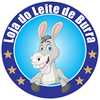Antimicrobial Activity of Donkey Milk against Dermatomycotic Fungi and Foodborne Bacteria
The antimicrobial activity of donkey milk was examined against 3 bacterial and 3 fungal strains selected on the basis of their relevance as human pathogens. All samples of donkey milk exhibited antimicrobial activity against dermatomycotic fungi and foodborne pathogen bacteria. The highest antimicrobial activity was recorded against Trichophyton mentagrophytes and T. rubrum with minimal lethal concentration of 32 mg/ml. In respect to foodborne pathogenic bacteria, Gram- positive bacteria (Bacillus cereus and Staphylococcus aureus) were more sensitive to donkey milk than Gram-negative bacteria (E. coli) with minimal lethal concentrations of 32, 64 and 128 mg/ml respectively. Donkey milk kept about 60 to 62% of its antimicrobial activity against B. cereus and S. aureus respectively, after digestion with pepsin (2 mg/ml), suggesting that the fatty acids of donkey milk have the highest antimicrobial effect. While the antimicrobial activity against dermatomycotic fungi and Gram-negative bacteria not affected after digestion with pepsin. To explain the antifungal capability of donkey milk against dermatomycotic fungi, fatty acids were analyzed by gas chromatography. Fatty acids analysis indicated that the major constituents in donkey milk lipid are oleic (25.4%), palmitic (23.75%), linolenic (20.04%), arachidic (3.58%) and stearic (3.26%), which have antimicrobial activity. Finally, on the basis of results obtained in the current study, the antimicrobial activity of donkey milk against Staphylococcus aureus and dermatomycotic fungi, specially T. mentagrophytes and T. rubrum which frequently cause acute or chronic inflammatory tinea corporis; may be considered as a valuable natural product with novel functional protection properties in cosmetics and pharmaceutical industries.
